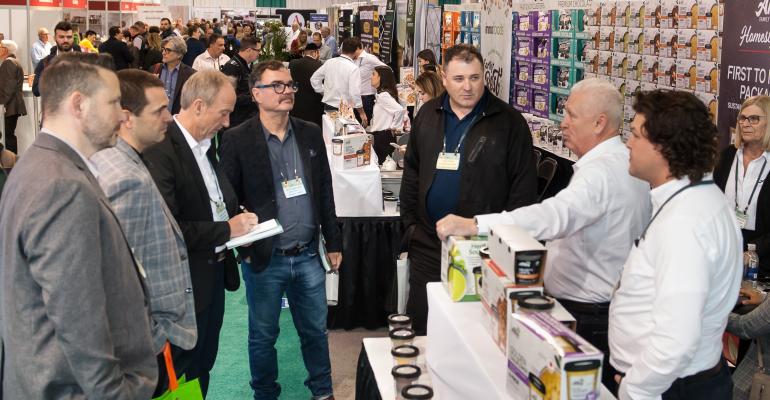Grocery private label has exploded over the last year. In fact, it has ballooned so much it no longer fits in the Private Label Manufacturers Association’s (PLMA) Annual Private Label Trade Show original floor plan.
So conference officials decided to expand the show’s footprint while also adding bonus sections. Kitchenware/houseware, wine/spirits, and beauty/cosmetics will get their own sections on the floor at this year’s show, which will be held Nov. 12-14 at the Donald E. Stephens Convention Center in Chicago.
PLMA said it expects around 5,000 attendees this year at the show, which will play off the theme “The Store Brands Phenomenon.” Attendees will get to see the latest in private label offerings from a record number 1,675 exhibitors, including 600 new exhibitors. Overall, more than 10,000 retailers, exhibitors, and other visitors are expected to attend.
The show is 20% larger than last year, resulting in an additional 435 exhibit booths, according to PLMA. In total, there will be 2,750 booths, which is another show record. Non-food exhibitors have expanded by 40%.
“That is nothing short of phenomenal,” said Anthony Aloia, corporate vice president of PLMA. “I think a couple of things have occurred. One, the private label industry is reaching a $230 billion segment, and you also are seeing the effects of a post pandemic.
“More countries have now opened up so what you are seeing is a general globalization of the industry.”
Aloia added that 45% of exhibitors are made up of international suppliers which have been divided up into country pavilions. He added that companies from Eastern Europe and Australia have increased their presence at the show in an attempt to diversify their trading partners.
Demand for global products is also increasing, a trend that is in turn broadening the selection on the show floor. Columbia, Peru, Chile, and Brazil are all relative newcomers to the show floor due to demand, Aloia said.
Non-food private label — including kitchenware/houseware, wine/spirits, and beauty/cosmetics — has been perhaps the fastest-growing segment, and the driver behind those categories getting new space on PLMA’s show floor.
Baby care items (diapers, wipes) is another area the private label industry is capitalizing on — another trend that will be reflected on the show floor.
“More and more families were coming together during the pandemic, and what we are seeing is that trend has continued where people are still cooking together at home,” Aloia said, referring to the rise in kitchenware/houseware items. “So you are seeing barbecue accessories [on the show floor] and cookware from countries like Italy.”
The international influence can be seen in the non-food business as well. Countries like Colombia, Italy, and South Korea are now involved in the beauty and cosmetics sector. South Africa has become a major player for wine and Portugal is now known for flavored liquors.
Interesting, new, and special
Another feature of this year’s PLMA show is the “idea supermarket” section, where gondolas will be set up showcasing retailer private label programs from around the world.
“We are bringing in programs that we think might be interesting or new,” said Aloia. “Not only from the U.S. but from around the world where a buyer could see what the competition is up to.”
The show will also recognize 400-600 new products this year in the New Product Expo. Products were selected by a PLMA committee.
PLMA’s Salute to Excellence winners will also be on display. A group of professionals and consumers rate each submitted product and determine the best in the show.
Private label on a high
For the first half of 2023, private label continued to post record sales and share, as it has for the past 18 months, according to data from PLMA and Circana.
Store brand dollar sales across all U.S. retail outlets increased year-over-year 8.2% during that period, vs. a gain of 5.1% for national brands, according to Circana data.
Unit sales for that same period tell a slightly different story. Store brand unit sales were nominally even, down 0.5%, while national brands fell 3.4%.
As a result of this performance, store brand dollar share rose to a record 18.8% for the first half of the year, while unit share moved up to 20.5%, also a new high.
“If you look over in Europe, private label has now reached 50% [market share], even 60% in some countries,” said Aloia.
“I think we might be on the verge of the new norm of higher prices across the board. So at the end of the day, while, yeah, I think inflation at some point is going to subside, I don’t think [price] is going to go back to the way it used to be.”
Aloia also cited climate change and credit card debt as two factors that will keep private label sales strong in the immediate years to come. (An increase in extreme weather may cause more supply chain shortages; and credit card delinquencies also have been on an upward trend while inflation has wreaked havoc on the family budget.)
Wine and beauty are two of the biggest areas seeing growth in private label.
Private label wine sales in the U.S. increased 9.1% year-over-year to $52.2 million during the 52 weeks ending June 18, according to data from Circana.
Albertsons recently launched a direct-to-consumer brand of wines, some of which cost over $1,000 a bottle. Circle K also introduced its first wine line in 3,000 stores in the U.S., and Gelson’s Markets in Southern California added four wines to its lineup.
“It is a growing category, and you know those retailers know their consumers and their preferences so they can tailor [the private label] to the market without going out on a limb,” said PLMA Marketing Specialist Libby Roberge





